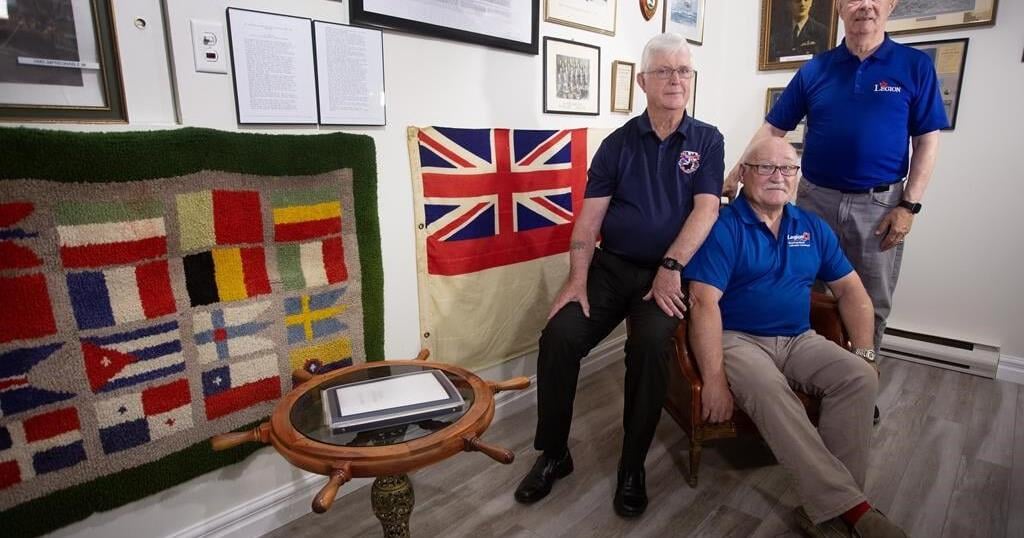ST. JOHN’S, N.L. – The remains of a soldier from Newfoundland killed in the battlefields of France during the First World War will be laid to rest in St. John’s Monday, bringing an emotional end to a years-long effort in a place still shaken and forever changed by the bloodshed.
Berkley Lawrence was among the delegation from Newfoundland who accompanied the soldier’s remains home from France last month in advance of Monday’s ceremony, at which the Unknown Soldier will be placed in a black granite tomb at the National War Memorial in St. John’s.
Lawrence served in the Canadian military for 33 years, and he is now the first vice-president of the Royal Canadian Legion.
His grandfather, Pte. Stephen Lawrence, was among the 800 members of the Royal Newfoundland Regiment who charged over the top of the trenches, armed with only rifles and bayonets, toward the Germans’ machine-gun fire at Beaumont-Hamel on the morning of July 1, 1916. More than 700 men were killed or wounded as the frontal assault became a slaughter that nearly wiped out the regiment.
Stephen Lawrence was wounded, and he was among the few who made it back home to Newfoundland, his grandson said.
“The (Unknown Soldier) we brought back could have been the person standing next to my grandfather in the trenches before they went over the top,” Lawrence said in a recent interview.
Monday is Canada Day in the rest of the country, but in Newfoundland and Labrador, July 1 begins as Memorial Day. It’s a time to remember the hundreds of young men from the Newfoundland Regiment who died during the disastrous battle in northern France, at a time when Newfoundland was not yet part of Canada. This year it also coincides with the 100th anniversary of the creation of the war memorial in St. John’s.
The staggering death toll at Beaumont-Hamel is still felt in Newfoundland today.
“There were soldiers from all over the province that came and joined up for the war effort in the First World War,” Lawrence said. “When we lost so many soldiers in the First World War, it affected every community.” At the time, Newfoundland was a self-governing dominion within the British Empire, home to about 240,000 people.
Author Michael Crummey, who co-wrote “Newfoundland at Armageddon,” a documentary film about Beaumont-Hamel, said he was struck by how personal the loss still seemed to be for the many people he spoke to in his research.
“I think because this place is so small, and the ties between everybody are so tight,” Crummey said in an interview. “Six degrees of separation just does not apply here, it’s one or two at best. So it does feel like all of those losses affected all of us, that our lives would be completely different if the First World War hadn’t happened.”
The war had other lasting impacts, apart from the human loss, Crummey added.
Newfoundland, as a dominion, raised an enormous amount of money to send its men to fight in the war, and the effort added about $35 million to the public debt, according to Heritage Newfoundland and Labrador.
Newfoundland’s heavy debt ultimately influenced its leaders’ decision to bring Newfoundland back under control of the British government in 1934, and to ultimately join Canada in 1949, Crummey said.
“In a way, I think July 1, the marking of what happened at Beaumont-Hamel, is a way of memorializing Newfoundland’s lost nationhood,” he said, adding: “It’s impossible to separate those strands — our sense of Newfoundland disappearing as a nation, and becoming something different, from what happened at Beaumont-Hamel.”
Bringing the Unknown Soldier home and laying him to rest at the National War Memorial may not bring closure, Crummey said. But it will give people a place to put all of that emotion.
“It’s a place for people to stand and allow that emotion to have a home,” he said.
Lawrence has been working for about seven years alongside two fellow veterans — Frank Sullivan and Gary Browne — to have the war memorial refurbished. Sullivan, who served with the regular and reserve forces for 42 years, came up with the idea to bring the Unknown Soldier home, Lawrence said. Politicians including federal Labour Minister Seamus O’Regan, who represents a riding in St. John’s, and Premier Andrew Furey, quickly joined the effort, he said.
They were able to argue that the Unknown Soldier brought from Vimy Ridge, in France, to the National War Memorial in Ottawa in 2000 didn’t quite capture Newfoundland’s First World War experience, since Newfoundland was not a part of Canada then.
The soldier’s tomb will represent deceased Newfoundlanders and Labradorians from all branches of service who have no known grave, and thus the soldier’s identity will not be investigated.
But members of the Royal Newfoundland Regiment had clear markings on their uniforms — a caribou button, or Newfoundland flashes on their shoulder — declaring their allegiance, Lawrence said.
Lawrence said he is preparing for an emotional day on Monday, but that he expects to also feel a great relief once the soldier is buried. He hopes that relief will be felt across the province.
The remains of the Unknown Soldier have been lying in state at the provincial legislature since Friday. Sunday is the last day for the public to visit them.
This report by The Canadian Press was first published June 30, 2024.
